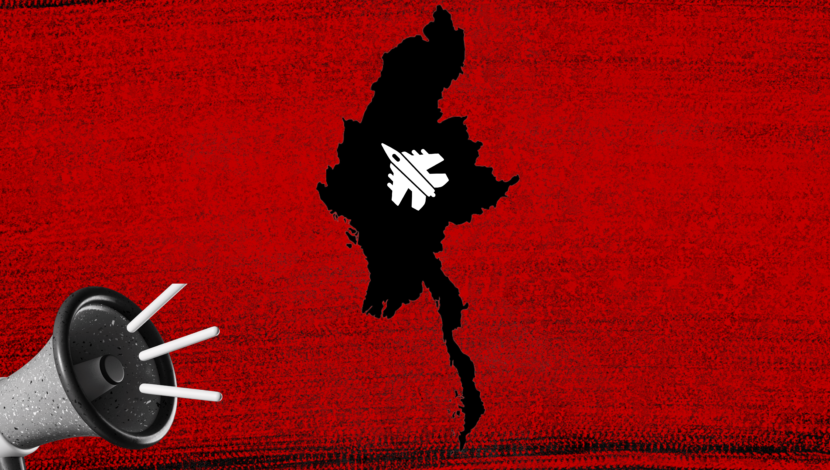The Unitarian Universalist Service Committee advances human rights through grassroots collaborations.
Vicious Attack on Burmese Concert-Goers Demands Action

By UUSC Staff on November 3, 2022
Since seizing power unlawfully last year in a brutal coup, the Burmese military has committed unspeakable atrocities against its own civilians—bombing, shooting, torturing, and falsely imprisoning thousands of innocent people. Such acts are part of a long-standing pattern of atrocity, dating back to the military’s prior era of dictatorial rule as well as the genocide they have inflicted on the Rohingya ethnic minority since 2017. Last month, however, witnessed what may be the junta’s deadliest single act since they returned to power in February 2021.
On October 25, Burmese military fighter jets bombed an outdoor concert in the country’s northern Kachin state, killing 80 people and wounding untold others. This unprovoked attack blatantly targeted a peaceful civilian gathering. Among its many victims were the popular Burmese singer Aurali Lahpai, who was performing at the event, as well as families and children. Not content with murdering so many innocent people, the military also reportedly blocked rescue workers from transporting the wounded to a medical facility, ensuring that even more civilians would needlessly die in the attack.
If these depraved acts are not enough to prompt the international community to take action, what will be? Yet, under their current policies, the United States and other wealthy countries are not only failing to prevent the Burmese military from killing its citizens—they are actively abetting its crimes.
Unlike Vladimir Putin’s Russia, the United States may not supply the Burmese military with planes directly—but its current policies are nonetheless literally fuelling their airstrikes. The junta has no domestic supply of aviation fuel, which means that they are entirely dependent on foreign imports to lift their fighter jets. If the U.S. and other international players cut off the supply of fuel, these jets would no longer be able to bomb and displace their own citizens. Yet the U.S. has so far hesitated to impose jet fuel sanctions on Burma, even though (or—perhaps—because) Western companies are believed to be involved in various stages of the fuel supply process.
By refusing to take action to block jet fuel sales to Burma, the U.S. government is ensuring the Burmese military will inflict even more aerial attacks on civilians. The October bombing in Kachin state was, after all, hardly an isolated incident. In recent weeks, the junta has also reportedly used their fighter jets to violate the airspace of neighboring nations. The month before, they used helicopter-mounted cannons to massacre 11 children by blasting apart a school classroom. In total, the military’s crimes, including both on-the-ground and aerial assaults targeting civilians, have forced roughly a million people to flee their homes, just since the coup.
The U.S.’s reluctance to impose life-saving sanctions—which would prevent the junta from butchering its own citizens in this way—is at odds with their own acknowledgement that the Burmese military has committed genocide and other grave crimes. If the Biden administration believes what it says about the junta’s track record (as well as the evidence of their own senses), they should no longer delay from imposing these sanctions. They should also enact similar much-needed restrictions on oil and gas conglomerates controlled by the military, which the junta uses to fund their atrocities.
The U.S. executive branch can impose some of these sanctions unilaterally—but a crucial step toward holding the Burmese military accountable also depends on Congress. For the past five years—in response to the Burmese military’s genocide against the Rohingya—UUSC and our partners have urged passage of the BURMA Act: a crucial legislative vehicle for sanctioning the Burmese military and providing aid to its victims. Now, this bill is closer than ever to enactment, having passed the House in April. A key Senate committee just needs to bring the bill to the floor, or incorporate it into this year’s annual defense spending bill.
A handful of U.S. senators with key committee posts wield disproportionate power to either block this legislation or move it forward. UUSC members based in Idaho have special leverage, as their junior senator Jim Risch could cast the deciding vote on whether the BURMA Act makes it to the Senate floor. They can take action to contact Risch here. Other UUSC members around the country can contact their own senators at this link.
The case for passing legislation to impose these sanctions is clear: if the Burmese junta cannot fund its attacks or fuel its fighter jets, it cannot continue to bomb its own civilians. It’s as simple as that. There is no justification for the U.S. government to wait a day longer to impose measures that would halt the military’s atrocities and prevent more loss of life. Congress should enact the BURMA Act today.
Image Credit – UUSC

